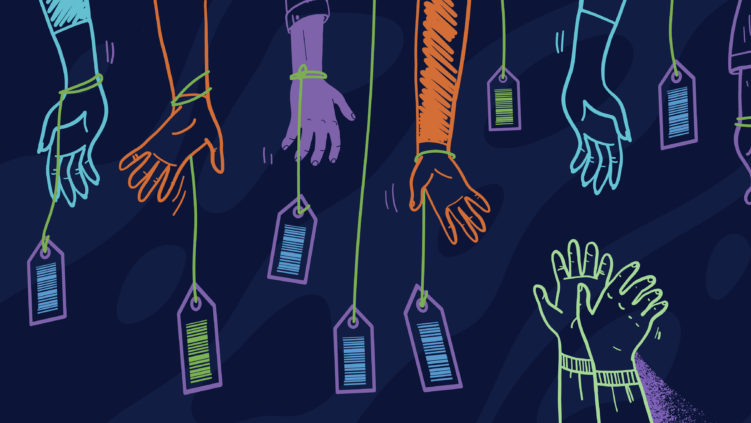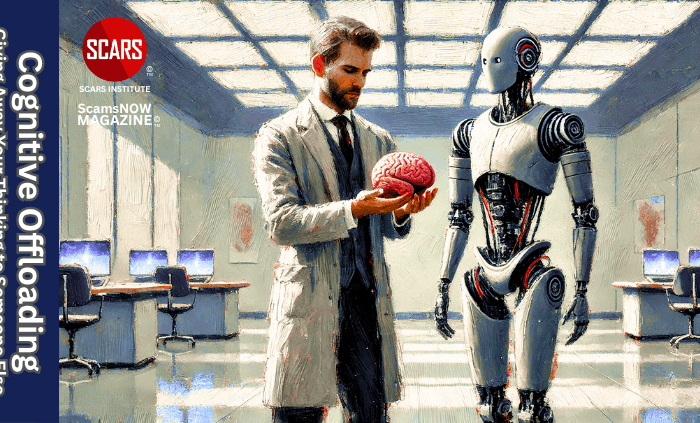The Knoble Report On Human Scam Trafficking
By The Knoble & SCARS Editorial Team – Society of Citizens Against Relationship Scams Inc.
From Fake Job Ads to Human Trafficking: The Horrifying Reality of the Human Trafficking Scam Trade
Human Trafficking Scam Trade preys on vulnerable individuals trapping victims in a web of human trafficking, coercion, fraud, and cryptocurrencies. Our new publication, in collaboration with The Mekong Club, Anti-Human Trafficking Intelligence Initiative, and Humanity Research Consultancy, sheds light on the shocking tactics used by criminal networks and highlights the complexities surrounding detection and prevention. Discover the hidden tactics involving fraud, money laundering, human trafficking, and cryptocurrencies, and learn how you can prevent this critical issue.
SCARS is a proud member of the Knoble.
Introduction To The Human Trafficking Scam Trade
In the fight against modern slavery and trafficking, the private sector plays a crucial role as it serves as the primary channel for 70% of the flows of illicit activities. Money is at the core of this insidious crime, flowing in and out of different countries through various channels. Modern-day slavery generates an estimated US$150 billion in profits each year, a significant portion of which is being funnelled into the global financial system.
The financial services industry, being at the forefront of this system, has a unique opportunity to detect suspicious activities and trends associated with money laundering and slavery.
Proper training can empower this industry to identify new forms of financial fraud, thereby reducing the risks associated with illegal and fraudulent businesses. As such, the financial services industry can take a proactive stance in the fight against modern slavery and trafficking.
According to estimates by the United Nations Interagency Project on Human Trafficking (UNIAP), someone becomes a victim of modern slavery every four seconds, with the criminal industry that fuels this practice earning over US$285,000 every minute. These statistics highlight the alarming scale and global reach of modern slavery and trafficking, which reduces human beings to mere commodities.
These crimes are not confined to any specific geographic region or industry; rather, they are prevalent across supply chains and affect individuals in both developed and developing nations.
The immense profits generated by modern slavery and human trafficking make it one of the world’s most lucrative criminal enterprises, second only to the drug trade. These profits are derived from the exploitation of an estimated 50 million people, making it a highly pervasive industry.
Due to its reliance on access to financial institutions, modern slavery and trafficking represent not only a destination for illicit proceeds but also a conduit for financing the entire process. Financial institutions are increasingly recognising their pivotal role in combating modern slavery and trafficking and are actively exploring ways to disrupt the flow of money that sustains this practice.
While the goal of completely eradicating modern-day slavery may be unrealistic, efforts to cut off its financial lifeline must not falter. By limiting the funds that support these heinous practices, we can help reduce the prevalence of modern slavery and human trafficking.
Recognition of modern slavery and human trafficking issues linked to cryptocurrencies is an emerging trend first seen toward the end of 2022. Traditional financial institutions need to be aware of how this could be used to launder money, and more specifically how it’s linked to modern slavery and human trafficking. So, what are cryptocurrencies and how are they used to launder money?
Cryptocurrencies are a type of digital asset designed to work as a medium of exchange. They use cryptography to secure and verify transactions as well as to control the creation of new units. Since cryptocurrencies are decentralised and operate on a distributed ledger called the blockchain, this means that transactions are recorded across a network of computers, making them difficult to manipulate or hack. Although cryptocurrencies are commonly used for legitimate purposes such as purchasing goods and services, investing, and sending money to family and friends, they are also used for illicit
activities such as money laundering. Cryptocurrencies can be used to launder money because they offer a level of anonymity and can be easily transferred across borders without the need for intermediaries like banks.A common method of using cryptocurrencies to launder money is called the ‘mixing’ process. Mixing involves combining funds from multiple transactions or wallets and then redistributing them to new wallets. This can make it difficult to trace the origin of funds and link them to criminal activity. Another method of using cryptocurrencies for money laundering is ‘tumbling’ services. Tumbling services are online platforms that offer to break up large cryptocurrency transactions into smaller ones, which are then sent to multiple recipients to obscure the original source of the funds.
Other methods include unregulated exchanges, peer-to-peer (P2P), prepaid cards, gaming sites and ATMs. Typically, with almost all the
methods mentioned, transactions from criminals can then be used to launder money by converting the cryptocurrencies into cash or other assets.The methods mentioned above are just some of the tactics used to conduct the pig butchering scams that commonly emerge from the scamming compounds. Victims in the compounds are often recruited overseas via fake job advertisements, enticed by high salaries, free flights, dream jobs and the opportunity to experience a new country. However, upon arrival they will be trafficked to a compound and forced to defraud individuals worldwide, including those in the United States, Canada, Europe, and other developed nations. Those who refuse may be subjected to physical violence, food deprivation, electric shocks and consumption of illicit drugs to keep them from sleeping and continue scamming (Podkul and Lui, 2022).
Read more in the PDF below …
-/ 30 /-
What do you think about this?
Please share your thoughts in a comment below!
More ScamsNOW.com Articles
-/ 30 /-
What do you think about this?
Please share your thoughts in a comment above!
SCARS LINKS: AgainstScams.org RomanceScamsNOW.com ContraEstafas.org ScammerPhotos.com Anyscam.com ScamsNOW.com
reporting.AgainstScams.org support.AgainstScams.org membership.AgainstScams.org donate.AgainstScams.org shop.AgainstScams.org
youtube.AgainstScams.org linkedin.AgainstScams.org facebook.AgainstScams.org
ARTICLE RATING
TABLE OF CONTENTS
- From Fake Job Ads to Human Trafficking: The Horrifying Reality of the Human Trafficking Scam Trade
- Introduction To The Human Trafficking Scam Trade
- Important Information for New Scam Victims
- Statement About Victim Blaming
- SCARS INSTITUTE RESOURCES:
- Psychology Disclaimer:
- More ScamsNOW.com Articles
- A Question of Trust
- SCARS Institute™ ScamsNOW Magazine
Society of Citizens Against Relationship Scams Inc. [SCARS]
CATEGORIES
MOST POPULAR COMMENTED ARTICLES
POPULAR ARTICLES
U.S. & Canada Suicide Lifeline 988
![NavyLogo@4x-81[1]](https://scamsnow.com/wp-content/uploads/2025/04/NavyLogo@4x-811.png)
ARTICLE META
WHAT PEOPLE ARE TALKING ABOUT LATEST SITE COMMENTS
See Comments for this Article at the Bottom of the Page
on Scam Victims Use Work To Avoid Healing: “The last 6 years have been the most difficult of my life. The pandemic, having both parents in the hospital…” Jun 29, 18:38
on Entitlement Mentality And How Scam Victims Often Lose Their Path To Recovery – 2024: “Thank you for this discussion of entitlement. I can see from the descriptions listed that I have not felt entitlement.…” Jun 29, 18:22
on Samurai Wisdom and Rituals for Clearing the Mind After Scam Trauma – 2025 – [VIDEOS]: “A great guide on how to move forward in our recovery process with a calm mind, cleansed on an ongoing…” Jun 28, 07:34
on Delayed Gratification and Patience in Scam Victim Recovery – 2025 – [VIDEOS]: “We want to recover quickly and… we make new mistakes. How not to speed up the recovery process, how to…” Jun 28, 06:41
on The Unique Injury Of Betrayal Trauma On Scam Victims – 2024: “Primarily because you did not see it coming” Jun 27, 23:57
on Changes In A Scam Victim’s Life: “I really detest the way my trust in others has been affected by the scamming I went through. I used…” Jun 27, 14:47
on The Unique Injury Of Betrayal Trauma On Scam Victims – 2024: “Betrayal Trauma is the worst feeling ever. Why does it seem so much worse when a scammer does that to…” Jun 27, 14:34
on EMDR Therapy For Scam Victims’ Trauma – A Part Of The Recovery Process For Many – 2024: “Very comprehensive article explaining all aspects of EMDR. I’d only heard of it before and now I have a much…” Jun 26, 19:01
on Forgiving Yourself After Surviving a Romance or Investment Scam – 2025: “Thank you for this valuable article. Self-forgiveness was for me the biggest step that led to my recovery. That also…” Jun 26, 17:28
on Counseling And Your Native Language: “These points make perfect sense. I can’t imagine trying to express complex emotions in a second language. I realize many…” Jun 26, 16:05
on Thought-Terminating Cliches – How What You and Others Say Stops Critical Thinking and Recovery for Scam Victims – 2025: “I didn’t realize that these “innocent phrases” clichés ending thoughts, can have such effect / negative -inhibiting / on our…” Jun 26, 14:48
on Scam Victim Resistance In Support Groups Therapy Or Counseling Can Destroy Opportunities For Recovery – 2024: “Working with either a support group or therapist to me means a self commitment to actively participating in the therapy.…” Jun 24, 21:01
on ‘I Just Want To Forget It’ – Denial & Avoidance Are Natural But Will Not Help Scam Victims On Their Path To Recovery From Scams – 2024: “My financial loss, the shock and betrayal of the crime ending all combined to fray my nerves and spend hours…” Jun 24, 20:10
on You Hate Being Told What To Do? How Your Rebellious Mentality Can Sabotage Your Recovery – 2025: “I am a bit of a rebel, and the moment someone tells me to do something, worse, does it even…” Jun 24, 15:04
on You Hate Being Told What To Do? How Your Rebellious Mentality Can Sabotage Your Recovery – 2025: “You are very welcome” Jun 24, 03:01
on You Hate Being Told What To Do? How Your Rebellious Mentality Can Sabotage Your Recovery – 2025: “This is a great article, which makes perfect sense as to why anyone would resist the help offered to them.…” Jun 23, 20:01
on Scam Victims’ Responsibilities – 2021 [Updated 2025]: “Thank you for this article. As I continue my journey, I focus on the here and now and let the…” Jun 21, 16:26
on Scam Victims Avoid Or Escape The Aftermath Of Scams – How Denial And Distraction Avoid Confronting Reality – 2024: “In the earliest days after my crime I felt powerless, helpless and weak. I had been through so much in…” Jun 21, 14:46
on Problems and Opportunities – Thoughts on Psychological Reframing – 2025: “An article that really helped me look at the problems in my life from a different point of view and…” Jun 21, 14:42
Important Information for New Scam Victims
Please visit www.ScamVictimsSupport.org – a SCARS Website for New Scam Victims & Sextortion Victims
SCARS Institute now offers a free recovery program at www.SCARSeducation.org
Please visit www.ScamPsychology.org – to more fully understand the psychological concepts involved in scams and scam victim recovery
If you are looking for local trauma counselors, please visit counseling.AgainstScams.org
If you need to speak with someone now, you can dial 988 or find phone numbers for crisis hotlines all around the world here: www.opencounseling.com/suicide-hotlines
Statement About Victim Blaming
Some of our articles discuss various aspects of victims. This is both about better understanding victims (the science of victimology) and their behaviors and psychology. This helps us to educate victims/survivors about why these crimes happened and not to blame themselves, better develop recovery programs, and help victims avoid scams in the future. At times, this may sound like blaming the victim, but it does not blame scam victims; we are simply explaining the hows and whys of the experience victims have.
These articles, about the Psychology of Scams or Victim Psychology – meaning that all humans have psychological or cognitive characteristics in common that can either be exploited or work against us – help us all to understand the unique challenges victims face before, during, and after scams, fraud, or cybercrimes. These sometimes talk about some of the vulnerabilities the scammers exploit. Victims rarely have control of them or are even aware of them, until something like a scam happens, and then they can learn how their mind works and how to overcome these mechanisms.
Articles like these help victims and others understand these processes and how to help prevent them from being exploited again or to help them recover more easily by understanding their post-scam behaviors. Learn more about the Psychology of Scams at www.ScamPsychology.org
SCARS INSTITUTE RESOURCES:
If You Have Been Victimized By A Scam Or Cybercrime
♦ If you are a victim of scams, go to www.ScamVictimsSupport.org for real knowledge and help
♦ Enroll in SCARS Scam Survivor’s School now at www.SCARSeducation.org
♦ To report criminals, visit https://reporting.AgainstScams.org – we will NEVER give your data to money recovery companies like some do!
♦ Follow us and find our podcasts, webinars, and helpful videos on YouTube: https://www.youtube.com/@RomancescamsNowcom
♦ Learn about the Psychology of Scams at www.ScamPsychology.org
♦ Dig deeper into the reality of scams, fraud, and cybercrime at www.ScamsNOW.com and www.RomanceScamsNOW.com
♦ Scam Survivor’s Stories: www.ScamSurvivorStories.org
♦ For Scam Victim Advocates visit www.ScamVictimsAdvocates.org
♦ See more scammer photos on www.ScammerPhotos.com
You can also find the SCARS Institute on Facebook, Instagram, X, LinkedIn, and TruthSocial
Psychology Disclaimer:
All articles about psychology and the human brain on this website are for information & education only
The information provided in this and other SCARS articles are intended for educational and self-help purposes only and should not be construed as a substitute for professional therapy or counseling.
Note about Mindfulness: Mindfulness practices have the potential to create psychological distress for some individuals. Please consult a mental health professional or experienced meditation instructor for guidance should you encounter difficulties.
While any self-help techniques outlined herein may be beneficial for scam victims seeking to recover from their experience and move towards recovery, it is important to consult with a qualified mental health professional before initiating any course of action. Each individual’s experience and needs are unique, and what works for one person may not be suitable for another.
Additionally, any approach may not be appropriate for individuals with certain pre-existing mental health conditions or trauma histories. It is advisable to seek guidance from a licensed therapist or counselor who can provide personalized support, guidance, and treatment tailored to your specific needs.
If you are experiencing significant distress or emotional difficulties related to a scam or other traumatic event, please consult your doctor or mental health provider for appropriate care and support.
Also read our SCARS Institute Statement about Professional Care for Scam Victims – click here
If you are in crisis, feeling desperate, or in despair, please call 988 or your local crisis hotline.
More ScamsNOW.com Articles
A Question of Trust
At the SCARS Institute, we invite you to do your own research on the topics we speak about and publish. Our team investigates the subject being discussed, especially when it comes to understanding the scam victims-survivors’ experience. You can do Google searches, but in many cases, you will have to wade through scientific papers and studies. However, remember that biases and perspectives matter and influence the outcome. Regardless, we encourage you to explore these topics as thoroughly as you can for your own awareness.



![Talking To Kids/Youth About Online Risk [VIDEO] - on ScamsNOW.com](https://scamsnow.com/wp-content/uploads/2023/08/shutterstock_659410001.jpg)










![scars-institute[1]](https://scamsnow.com/wp-content/uploads/2025/04/scars-institute1.png)
![niprc1.png1_-150×1501-1[1]](https://scamsnow.com/wp-content/uploads/2025/04/niprc1.png1_-150x1501-11.webp)
